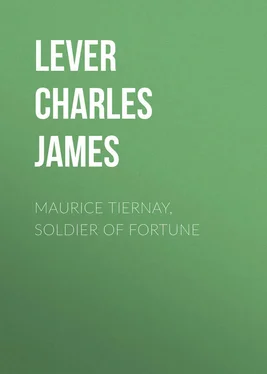Charles Lever - Maurice Tiernay, Soldier of Fortune
Здесь есть возможность читать онлайн «Charles Lever - Maurice Tiernay, Soldier of Fortune» — ознакомительный отрывок электронной книги совершенно бесплатно, а после прочтения отрывка купить полную версию. В некоторых случаях можно слушать аудио, скачать через торрент в формате fb2 и присутствует краткое содержание. Жанр: literature_19, foreign_antique, foreign_prose, на английском языке. Описание произведения, (предисловие) а так же отзывы посетителей доступны на портале библиотеки ЛибКат.
- Название:Maurice Tiernay, Soldier of Fortune
- Автор:
- Жанр:
- Год:неизвестен
- ISBN:нет данных
- Рейтинг книги:3 / 5. Голосов: 1
-
Избранное:Добавить в избранное
- Отзывы:
-
Ваша оценка:
- 60
- 1
- 2
- 3
- 4
- 5
Maurice Tiernay, Soldier of Fortune: краткое содержание, описание и аннотация
Предлагаем к чтению аннотацию, описание, краткое содержание или предисловие (зависит от того, что написал сам автор книги «Maurice Tiernay, Soldier of Fortune»). Если вы не нашли необходимую информацию о книге — напишите в комментариях, мы постараемся отыскать её.
Maurice Tiernay, Soldier of Fortune — читать онлайн ознакомительный отрывок
Ниже представлен текст книги, разбитый по страницам. Система сохранения места последней прочитанной страницы, позволяет с удобством читать онлайн бесплатно книгу «Maurice Tiernay, Soldier of Fortune», без необходимости каждый раз заново искать на чём Вы остановились. Поставьте закладку, и сможете в любой момент перейти на страницу, на которой закончили чтение.
Интервал:
Закладка:
The commotion of Paris on that memorable morning was, then, to my thinking, little more than usual If the crowds who pressed their way to the Place de la Revolution were greater – if the cries of vengeance were in louder utterance – if the imprecations were deeper and more terrible – the ready answer that satisfied all curiosity was – it was Robespierre who was on his way to be executed. Little knew I what hung upon that life! and how the fate of millions depended upon the blood that morning was to shed! Too full of myself and my own projects, I disengaged myself from the crowds that pressed eagerly towards the Tuileries, and took my way by less-frequented streets in the direction of the Boulevard Mont Parnasse.
I wished, if possible, to see the père once more, to take a last farewell of him, and ask his blessing, too; for still a lingering faith in the lessons he had taught me continued to haunt my mind amidst all the evil influences with which my wayward life surrounded me. The further I went from the quarter of the Tuileries, the more deserted and solitary grew the streets. Not a carriage or horseman was to be seen – scarcely a foot-passenger. All Paris had, apparently, assembled on the Place de la Révolution; and the very beggars had quitted their accustomed haunts to repair thither. Even the distant hum of the vast multitude faded away, and it was only as the wind bore them that I could catch the sounds of the hoarse cries that bespoke a people’s vengeance. And now I found myself in the little silent street which once had been my home. I stood opposite the house where we used to live, afraid to enter it lest I might compromise the safety of her I wished to save, and yet longing once more to see the little chamber where we once sat together – the chimney-corner where, in the dark nights of winter, I nestled, with my hymn-book, and tried to learn the rhymes that every plash of the falling hail against the windows routed – to lie down once more in the little bed, where so often I had passed whole nights of happy imaginings – bright thoughts of a peaceful future that were never to be realised!
Half choking with my emotion, I passed on, and soon saw the green fields, and the windmill-covered hill of Montmartre rising above the embankment of the Boulevards – and now the ivy-clothed wall of the garden, within which stood the chapel of St. Blois. The gate lay ajar as of old, and, pushing it open, I entered. Everything was exactly as I had left it – the same desolation and desertion everywhere – so much so, that I almost fancied no human foot had crossed its dreary precincts since last I was there. On drawing nigh to the chapel, I found the door fast barred and barricaded as before; but a window lay open, and on examining it closer I discovered the marks of a recent foot-track on the ground and the window-sill. Could the Père Michel have been there? was the question that at once occurred to my mind. Had the poor priest come to take a last look and a farewell of a spot so dear to him? It could scarcely have been any other. There was nothing to tempt cupidity in that humble little church; an image of the ‘Virgin and Child’ in wax was the only ornament of the altar. No, no; pillage had never been the motive of him who entered here.
Thus reasoning, I climbed up to the window, and entered the chapel. As my footsteps echoed through the silent building, I felt that sense of awe and reverence so inseparably connected with a place of worship, and which is ever more impressive still as we stand in it alone. The present, however, was less before me than the past, of which everything reminded me. There was the seat the marquise used to sit in – there the footstool I had so often placed at her feet. How different was the last service I had rendered her! There the pillar, beside which I have stood spell-bound, gazing at that fair face, whose beauty arrested the thoughts that should have wended heavenward, and made my muttered prayers like offerings to herself. The very bouquet of flowers some pious hand had placed beneath the shrine – withered and faded – was there still. But where were they whose beating hearts had throbbed with deep devotion? How many had died upon the scaffold! – how many were still lingering in imprisonment, some in exile, some in concealment, dragging out lives of misery and anxiety! What was the sustaining spirit of such martyrdom? I asked myself again and again. Was it the zeal of true religion, or was it the energy of loyalty that bore them up against every danger, and enabled them to brave death itself with firmness? – and if this faith of theirs was thus ennobling, why could not France be of one mind and heart? There came no answer to these doubts of mine, and I slowly advanced towards the altar, still deeply buried in thought. What was my surprise to see that two candles stood there, which bore signs of having been recently lighted. At once the whole truth flashed across me – the père had been there; he had come to celebrate a mass – the last, perhaps, he was ever to offer up at that altar. I knew with what warm affection he loved every object and every spot endeared to him by long time, and I fancied to myself the overflowing of his heart as he entered once more, and for the last time, the little temple, associated with all the joys and sorrows of his existence. Doubtless, too, he had waited anxiously for my coming; mayhap in the prayers he offered I was not forgotten. I thought of him kneeling there, in the silence of the night, alone, as he was, his gentle voice the only sound in the stillness of the hour, his pure heart throbbing with gratitude for his deliverance, and prayerful hopes for those who had been his persecutors. I thought over all this, and, in a torrent of emotions, I knelt down before the altar to pray. I know not what words I uttered, but his name must somehow have escaped my lips, for suddenly a door opened beside the altar, and the Père Michel, dressed in his full vestments, stood before me. His features, wan and wasted as they were, had regained their wonted expression of calm dignity, and by his look I saw that he would not suffer the sacred spot to be profaned by any outburst of feeling on either side.
‘Those dreadful shouts tell of another massacre,’ said he solemnly, as the wind bore towards us the deafening cries of the angry multitude. ‘Let us pray for the souls’ rest of the departed.’
‘Then will your prayers be offered for Robespierre, for Couthon, and St. Just,’ said I boldly.
‘And who are they who need more the saints’ intercession – who have ever been called to judgment with such crimes to expiate – who have ever so widowed France, and so desecrated her altars? Happily, a few yet remain where piety may kneel to implore pardon for their iniquity. Let us recite the Litany for the Dead,’ said he solemnly, and at once began the impressive service.
As I knelt beside the rails of the altar, and heard the prayers which, with deep devotion, he uttered, I could not help feeling the contrast between that touching evidence of Christian charity and the tumultuous joy of the populace, whose frantic bursts of triumph were borne on the air.
‘And now come with me, Maurice,’ said he, as the Litany was concluded. ‘Here, in this little sacristy, we are safe from all molestation; none will think of us on such a day as this.’
And as he spoke he drew his arm around me, and led me into the little chamber where once the precious vessels and the decorations of the church were kept.
‘Here we are safe,’ said he, as he drew me to his side on the oaken bench, which formed all the furniture of the room. ‘To-morrow, Maurice, we must leave this, and seek an asylum in another land; but we are not friendless, my child – the brothers of the “Sacred Heart” will receive us. Their convent is in the wilds of the Ardennes, beyond the frontiers of France, and there, beloved by the faithful peasantry, they live in security and peace. We need not take the vows of their order, which is one of the strictest of all religious houses; but we may claim their hospitality and protection, and neither will be denied us. Think what a blessed existence will that be, Maurice, my son, to dwell under the same roof with these holy men, and to imbibe from them the peace of mind that holiness alone bestows; to awake at the solemn notes of the pealing organ, and to sink to rest with the glorious liturgies still chanting around you; to feel an atmosphere of devotion on every side, and to see the sacred relics whose miracles have attested the true faith in ages long past. Does it not stir thy heart, my child, to know that such blessed privileges may be thine?’
Читать дальшеИнтервал:
Закладка:
Похожие книги на «Maurice Tiernay, Soldier of Fortune»
Представляем Вашему вниманию похожие книги на «Maurice Tiernay, Soldier of Fortune» списком для выбора. Мы отобрали схожую по названию и смыслу литературу в надежде предоставить читателям больше вариантов отыскать новые, интересные, ещё непрочитанные произведения.
Обсуждение, отзывы о книге «Maurice Tiernay, Soldier of Fortune» и просто собственные мнения читателей. Оставьте ваши комментарии, напишите, что Вы думаете о произведении, его смысле или главных героях. Укажите что конкретно понравилось, а что нет, и почему Вы так считаете.












